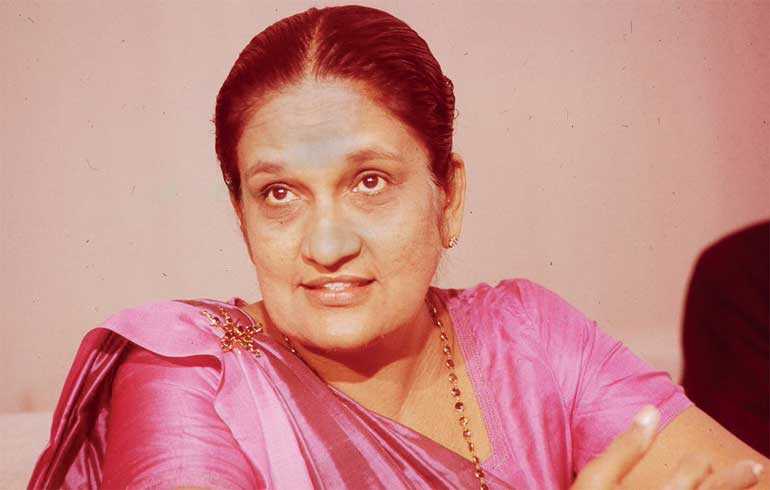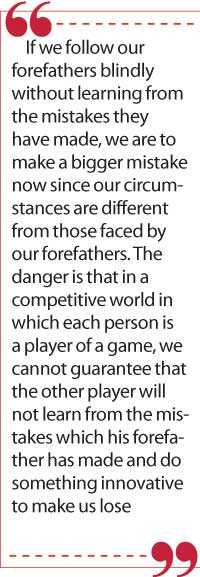Tuesday Feb 24, 2026
Tuesday Feb 24, 2026
Monday, 20 April 2020 00:10 - - {{hitsCtrl.values.hits}}

Sirimavo Bandaranaike should earn our respect for many other things she did for the nation, but not for the way she managed the economy
With the breakdown of markets during COVID-19 pandemic, both locally and globally, a strong public opinion is now being mooted for restoring self-sufficiency and independent existence. Markets had nourished people for centuries unfailingly, making them an essential part of modern human living. They were so neatly woven into living that it was unthinkable to have an existence without them. But that has now come to an abrupt end due to restrictions imposed by governments on public gatherings, movements and usual face-to-face acts of social intercourse. 
The voluntary or enforced self-isolation with a new norm of social-distancing even within an individual household has reignited the dream which people always had with them to be independent and self-sufficient. This is an unsalutary development since no one can be self-sufficient or independent either individually or as a nation. A good example is that our self-isolation is being supported by mobile traders who visit our doorsteps with goodies that we need for survival and existence. If they do not come, we will perish.
The modern hat-seller and monkey story
In Sri Lanka, the nostalgia being harboured has been to a return to the times of Sirimavo Bandaranaike who ruled the country as its Prime Minister from 1960 to 1977 except the period from 1965 to 1970. This nostalgic claim reminds us of the modern ‘hat-seller and monkey story’ as narrated by Kaushik Basu, formerly Chief Economist of the World Bank and presently, academic at Cornell University in his 2010 book titled ‘Beyond the Invisible Hand: Groundwork for a New Economics’.
Old story where monkeys were tricked
The old story that we had learned in the primary school goes as follows. A hat-seller travelling from place to place to sell his hats had fallen asleep under the shade of a tree when he lay down for a brief rest. When he woke up, he found that all his hats, except the one he was wearing, had disappeared. On looking up, he had seen a group of monkeys wearing his hats and mocking him from the branches of the tree.
Since it was impossible to climb up the tree and recover the hats from monkeys, he had played a trick on them. He had taken his hat off to be seen by monkeys and thrown it away. Monkeys in a bid to imitate him had done the same. The hat-seller had collected the hats promptly and hurriedly gone on in his business to the disappointment of monkeys.
Modern story where monkeys had learned from past mistakes
Kaushik Basu, has created the modern ‘hat-seller and monkey story’ by taking it two generations forward. In this second part, the grandson of the hat-seller, following the footsteps of his Grandfather, had chosen selling of hats by travelling from place to place for a living. He too had travelled along the same route and had slept under the same tree to take a brief respite. Then, a group of monkeys had come down from the tree and liberally appropriated the hats for themselves as it had happened previously.
On waking up and having seen the monkeys on tree-tops wearing his hats, he had remembered how his grandfather had tricked them to recover the hats. He had taken his hat off and thrown it away. Monkeys, instead of imitating him, had got one of the monkeys to come down, collect the hat and walk up to where he was lying down. The monkey is said to have slapped the hat-seller hard and told him: “Do you think only you had a grandfather?” before joining the other monkeys.
 Moral: Don’t follow forefathers blindly
Moral: Don’t follow forefathers blindly
The moral of the story is that intergenerational learning – wisdom and knowledge passed from one generation to another through stories, direct teaching and imitation – takes place and if we do not learn it properly, we are set in for disaster.
If we follow our forefathers blindly without learning from the mistakes they have made, we are to make a bigger mistake now since our circumstances are different from those faced by our forefathers. The danger is that in a competitive world in which each person is a player of a game, we cannot guarantee that the other player will not learn from the mistakes which his forefather has made and do something innovative to make us lose. This was ably done by the later generation monkeys in the previous modern monkey story.
Former Malaysian Prime Minister Mahathir Mohammad had put it aptly when he said that we should learn history not to dwell on it but to avoid making the same mistake which our forefathers had made.
Sirimavo’s creditable actions
The present campaign for a return to Sirimavo Bandaranaike era is one such instance. Sirimavo Bandaranaike should earn our respect for many other things she had done for the nation, but not for the way she managed the economy.
She was a leader who had thought of social inclusion from the very beginning. Accordingly, she effectively removed the glass door that had been erected to prevent those who had studied in Sinhala or Tamil medium from joining the public service, police service, armed forces, state banks or the Central Bank.
As a person, she conducted herself honourably. She is reported to have told the class teacher of Anura Bandaranaike, when the former had slapped the latter for his unruly behaviour, why he did not slap Mallo, the pet name for Anura, on the other cheek as well. When one of her personal aides had stormed the exchange control department of the Central Bank and demanded preferential treatment by way of a higher foreign exchange quota for her because she was on Prime Minister’s staff, Sirimavo, on being contacted by phone in the presence of exchange control officers, is said to have ordered her to follow the Central Bank rules.
She had the courage not to yield herself to the pressure coming from a section of Buddhist monks to ban Martin Wickramasinghe’s Bavatharanaya on the ground of claimed insultation to the Buddha.
Her credentials in the international arena had been well beyond a third world country leader. One such story relates to how she, like a true stateswoman, handled a case relating to Libyan leader Muammar Gaddafi during the Non-Aligned Movement’s Summit in Colombo in 1976. In this instance, a security contingent of Gaddafi had arrived in the Colombo Airport before their leader had landed without visas or passports but fully armed to the teeth. Sri Lankan security officers had been scared of taking any action against them since Gaddafi had been a leading figure in the non-aligned movement at that time. But Sirimavo had ordered that they should be packed into the same plane and deported to where they had come.
Gaddafi who had come later had not made any fuss about it and behaved as if nothing had happened because Sirimavo’s charming personality had shone more brightly before the eyes of other world leaders than his soldierly rough appearance garbed in military fatigue.
Contrast between Sirimavo and Lee Kuan Yew
Both Sirimavo Bandaranaike and Lee Kuan Yew became leaders of their respective countries around the same time. But their economic policies were a way apart from each other.
Sirimavo had chosen to follow the economic model which had been adopted by the Soviet Union, China, India and some of the newly independent African countries. According to this model, the West was considered a conspirator that was eagerly waiting to swallow newly independent countries. It was claimed that they did it through a system of neo-colonialism in which the countries in the Third World were brought under their domination not directly but indirectly. The dependence on them was considered similar to being infected by a virus.
A popular slogan uttered by the intelligentsia that propagated this view was that when USA got a cold, countries like Ceylon got pneumonia. Hence, similar to the ‘social distancing’ being practiced today, Sirimavo chose to practice ‘economic distancing’ with the West. This was practiced to an extreme by taking over foreign owned oil companies, insurance companies, privately run schools, plantation companies and so on.
With the nationalisation of the Bank of Ceylon and the creation of the Peoples Bank in 1961, foreign banks operating in the country were prohibited to accept new customers thereby giving a monopoly status to the two state banks. They enjoyed this position till 1977 when the banking sector was open for international banks of repute. At the same time, there was no trust in the domestic private sector. Hence, the state sector was expanded to the exclusion of the domestic or foreign private initiatives and enterprises.
Foresight of Lee Kuan Yew
Lee Kuan Yew followed the opposite in Singapore. He was continuously advised by some that he should rely mainly on his two giant neighbours to the north and the south, namely, Malaysia and Indonesia. But after assessing the economic prospects with these two giants, he realised that nothing substantial cannot be attained by Singapore by relying on them. Hence, his policy was to ‘leap-frog’ over these giant neighbours to the West in all directions: Japan, Australia, New Zealand, Europe, and North America.
To fill the savings-investment gap and acquire the necessary export market access and technology, foreign direct investors of repute were invited to Singapore. To encourage the experts from Western countries to come and work in Singapore, the whole country was converted to a ‘Western Oasis’ in which all local services in the government, education, transportation, roads, health services etc were upgraded to Western standards.
The Singapore universities were forced to adopt English as the medium of instruction and get affiliated with the best of the best universities in USA such as MIT, Harvard and Chicago. In this manner, the local universities were brought up to the level of the top US universities known as Ivy League universities. These universities in turn developed local technology and with that, Singapore could not stop moving fast along the development path.
As the first finance minister Goh Keng Swee pronounced proudly, that old regime had not believed that ‘no one owes a living to Singaporeans’. Singapore should stand on its own feet and work hard to deliver prosperity to people. The accepted motto was that there was no such thing as a free lunch.
Sri Lanka’s leaders: The rest of the world owes us a living
Sri Lanka’s government in contrast blamed the Western world for the pity state the country’s economy had been undergoing. Contrary to this, when the British left Ceylon in 1948, they had left a huge foreign exchange reserve sufficient for meeting 17 months of future import requirements of the country. The Ceylon Civil Service was such an exemplary institution by itself that it was the envy of many emerging countries at that time.
But after independence, the whole nation was converted by local leaders to a nation of beggars who always believed that it was always possible to enjoy a free lunch without incurring the relevant costs. The expansion of public expenditure increasing the size of the government in turn increased the aggregate demand. In the absence of a corresponding increase in the aggregate supply, there was pressure for prices to increase, on one side, and creating a sizable deficit in the current account of the balance of payments, on the other.
Making mistakes one after the other
Instead of addressing the issue at the root by curtailing the public expenditure programs and improving the productivity in the economy, a series of mistakes were committed one after the other mainly after 1970. To suppress the price inflation and pressure for the rupee to fall, an economy wide price controls and a strict regime of exchange and import controls were introduced. This created a shortage of goods and to solve that problem, essential goods were distributed through a system of rationing.
Since the rationing could not be implemented through private businesses, an empire of government owned wholesale and retail businesses were established. It created long queues in front of those State-owned retail shops for day to day goods consumed by people and long waiting lists for other consumer durables. Both were inefficient methods of distribution since it imposed a heavy transaction cost of acquiring goods – a phenomenon known as ‘deadweight losses’ because it was a loss to those who had to incur the transaction cost but no one else in the economy gained out of it.
 The working of the licence-raj in house construction
The working of the licence-raj in house construction
I have the personal experience of how this system worked in relation to the construction of my house. The plan of the house had to be approved by the Assistant Government Agent of the area first. Then, a dozen of blueprints had to be taken to be presented to each of the government authority concerned: to Cement Corporation for cement, Timber Corporation for timber, Ceramic Corporation for sanitaryware and roofing tiles, Building Materials Corporation for electrical items, fixtures and fittings, State Trading Corporation for household items like ceiling fans etc and the Steel Corporation for steel.
This involved spending long hours in these places just to get a licence and those licensees had to pay gratifications to those in the organisation to alert them when the goods were available. We as consumers could not choose and had to accept what was given. Only bricks and sand were available from the market. Today, anyone building a house can get what he needs just by going to the market.
Complicating even simple market transactions
The government had to build this empire because it did not trust the private initiatives. Imports were under strict controls and they had to be necessarily handled by government organisations. This led to inefficiency, corruption, waste and high transaction costs.
Just as an example, to issue an ordinary electrical switch, Building Materials Corporation had to employ about six people: one to authorise the sale after checking the plan, another to record it in its register, a third to write the bill, a fourth as the cashier, a fifth to issue the switch and a sixth at the gate to check whether all the documentation was in order. It took long hours to complete this whole process. This is a simple sale where only one person would handle it in an ordinary electrical shop anywhere in the country within a few minutes.
Instead of destroying markets, let’s rebuild them on modern lines
We have destroyed the markets through government’s counter action in the present COVID-19 pandemic. Of course, it is a good cause. But it does not mean that we should revert to the old system after the pandemic is eradicated without learning the mistakes our forefathers had made. Let’s reconstruct the markets from a scratch on modern lines so that it would continue to nourish people efficiently.
(The writer, a former Deputy Governor of the Central Bank of Sri Lanka, can be reached at [email protected].)